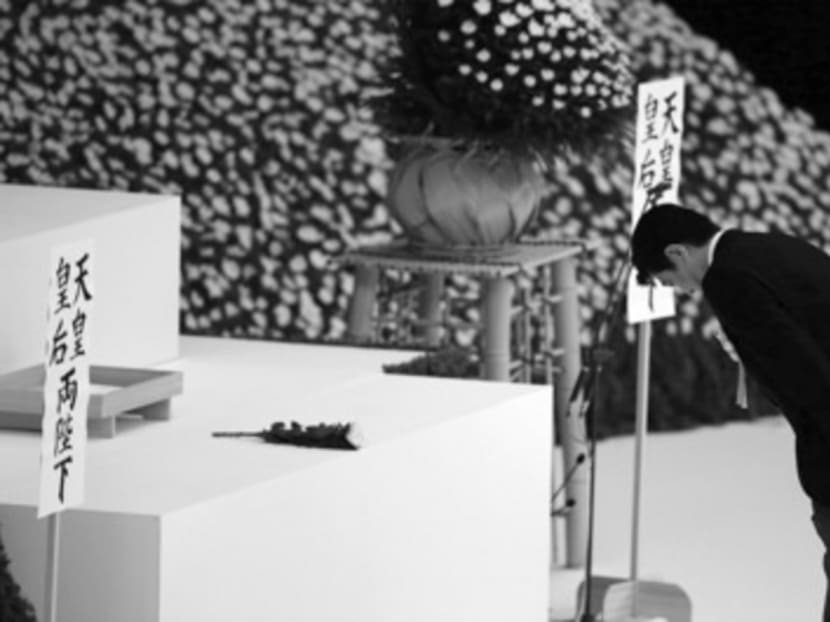Time for bitter war memories to fade
In 1970, German Chancellor Willy Brandt fell to his knees before a monument to the victims of the Warsaw ghetto uprising. The gesture became a symbol of German contrition. In 1984, Francois Mitterrand and Mr Helmut Kohl, then leaders of France and Germany, respectively, held hands in a moving ceremony in Verdun, site of a battle in which 700,000 or more soldiers were wounded or killed in 1916.

Mr Shinzo Abe bowing after offering a chrysanthemum to the war dead during a memorial service to mark the 69th anniversary of Japan’s surrender in World War II, at Budokan Hall in Tokyo last year. Photo: REUTERS
In 1970, German Chancellor Willy Brandt fell to his knees before a monument to the victims of the Warsaw ghetto uprising. The gesture became a symbol of German contrition. In 1984, Francois Mitterrand and Mr Helmut Kohl, then leaders of France and Germany, respectively, held hands in a moving ceremony in Verdun, site of a battle in which 700,000 or more soldiers were wounded or killed in 1916.
In Asia, 70 years after World War II, it is almost impossible to imagine similar acts of reconciliation. Rather than being less contentious as memories fade, contemporary views of history have become ever more bitter.
Japan and the United States have become close allies. Yet, even they cannot agree on how to remember history. One idea for this year that would have had Japanese Prime Minister Shinzo Abe visit Pearl Harbor while US President Barack Obama visited Hiroshima has come to naught. Such are the disagreements that persist about what those two events mean that neither leader could say anything meaningful without causing offence to victim or perpetrator. In particular, Mr Obama would find it hard to apologise for a nuclear bomb that most Americans argue saved lives by shortening the war.
What is hard for the US and Japan is nigh on impossible for others. True, some of Japan’s former victims have put history aside, including the Philippines, Indonesia and Australia. But in China and South Korea, rancour still runs deep.
Leaders in all three countries have a perverse interest in keeping old animosities alive. China’s Communist Party draws legitimacy from its role in driving out Japanese occupation forces. For South Korean President Park Geun-hye, anti-Japanese sentiment still unites voters. For Mr Abe, too, the widespread perception of a powerful and unforgiving China has been crucial in his efforts to beef up military strength and reinterpret the pacifist Constitution.
A BETTER HISTORY TO REMEMBER
Over the years, Japanese Prime Ministers have issued apologies, yet it remains common to hear that Japan has never properly acknowledged its history. Nor is the irony lost of China’s Communist Party, masters of expunging recent events, lecturing Japan on coming clean about the past.
In 2001, Japan’s then Prime Minister Junichiro Koizumi said: “We conducted colonisation and aggressive acts based on a mistaken national policy and caused immeasurable pain and suffering. I wish, in the light of our country’s regrettable history ... to express my deepest regret and remorse.”
That is an apology, although of course the recipients are free to judge its sincerity. For them, such statements have all too often been undermined by Japanese nitpicking about historical detail — the number killed at Nanjing or the degree of coercion in supplying wartime brothels.
Professor Jeff Kingston, who specialises in international studies at Temple University in Tokyo, said: “Japan needs a forthright reckoning, but the responsibility is also on neighbours to accept ... the proffered olive branch.”
Again, one can look to Europe. On the Armistice Day anniversary in 2009, then French President Nicolas Sarkozy said the war was “equally terrible on both sides”, adding that, just as French orphans and wives wept for their fathers and husbands, so did German orphans and wives. In the current climate, it is hard to imagine such sentiments being expressed in Beijing or Seoul.
If history cannot be settled, it can at least be managed. Here, Mr Abe’s hints that he wants to re-examine the language of past apologies has been unhelpful. In remarks in which he appeared to question the meaning of invasion, for example, he has provided ammunition to those who claim that Japan still disputes its wartime culpability.
Mr Abe’s obsession with rescuing Japanese honour from the horrors of the 1930s and 1940s is misplaced. Rather than glossing over that period in school, Japanese children could learn greatly from studying it. Not so that they can bow their heads in shame, but so they can study the failings of a system that allowed Japan to slip into a disastrous, unwinnable war.
As for Mr Abe’s ambition that the Japanese learn to be proud, nothing could be easier. For this, there are far better corners of history to rummage around in than the years of Japanese aggression. For whole stretches of its antiquity, whether during the Heian, Tokugawa or other periods, Japan was a cauldron of cultural and social invention.
More recently, the 1950s to 1970s were extraordinary decades when Japan proved Asian nations were every bit as capable as Europeans of building a wealthy, modern society.
That is a period of Japanese history that has served Asia — and Asians — well. On this, almost everyone can agree. THE FINANCIAL TIMES
ABOUT THE AUTHOR:
David Pilling is the Financial Times’ Asia editor.






